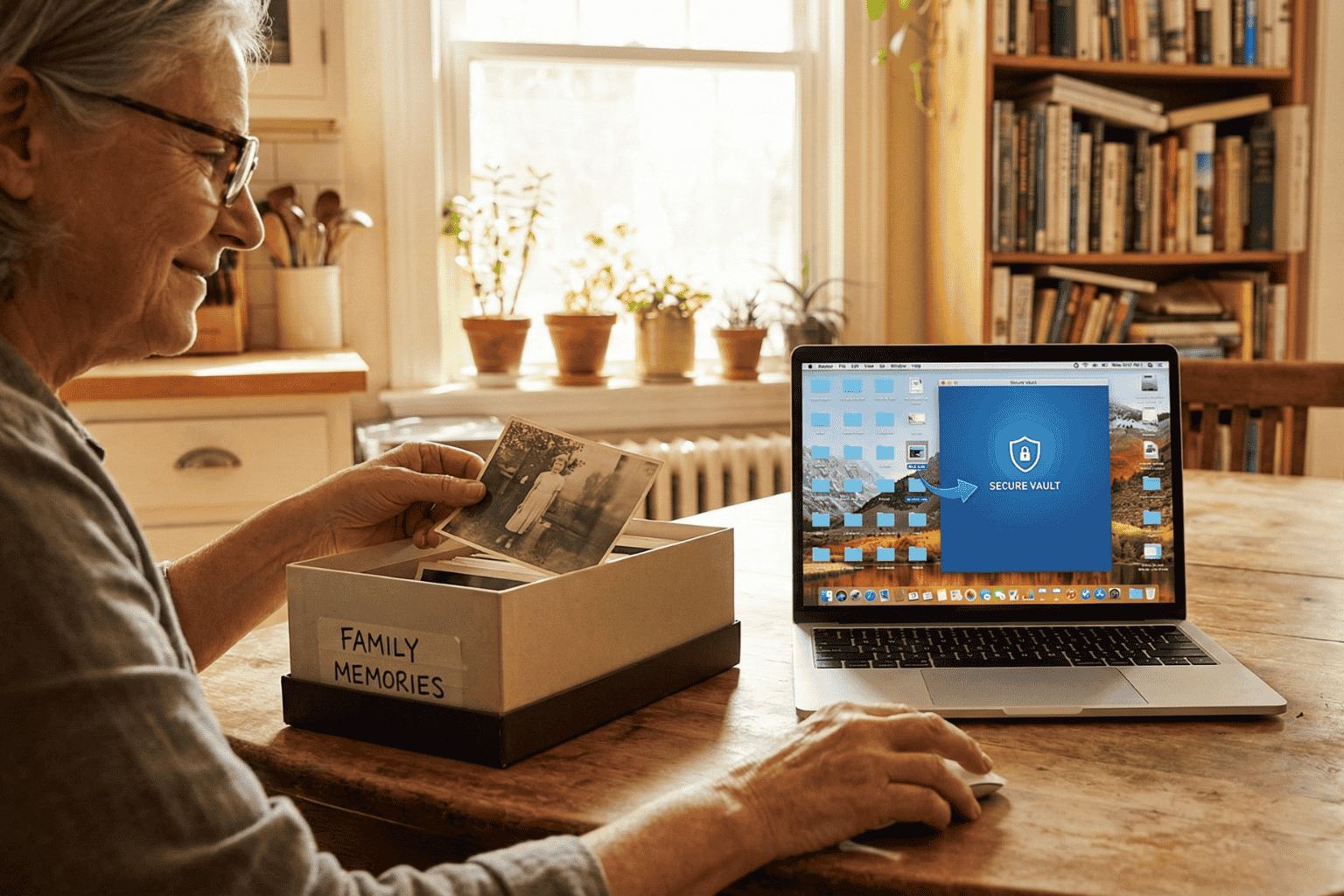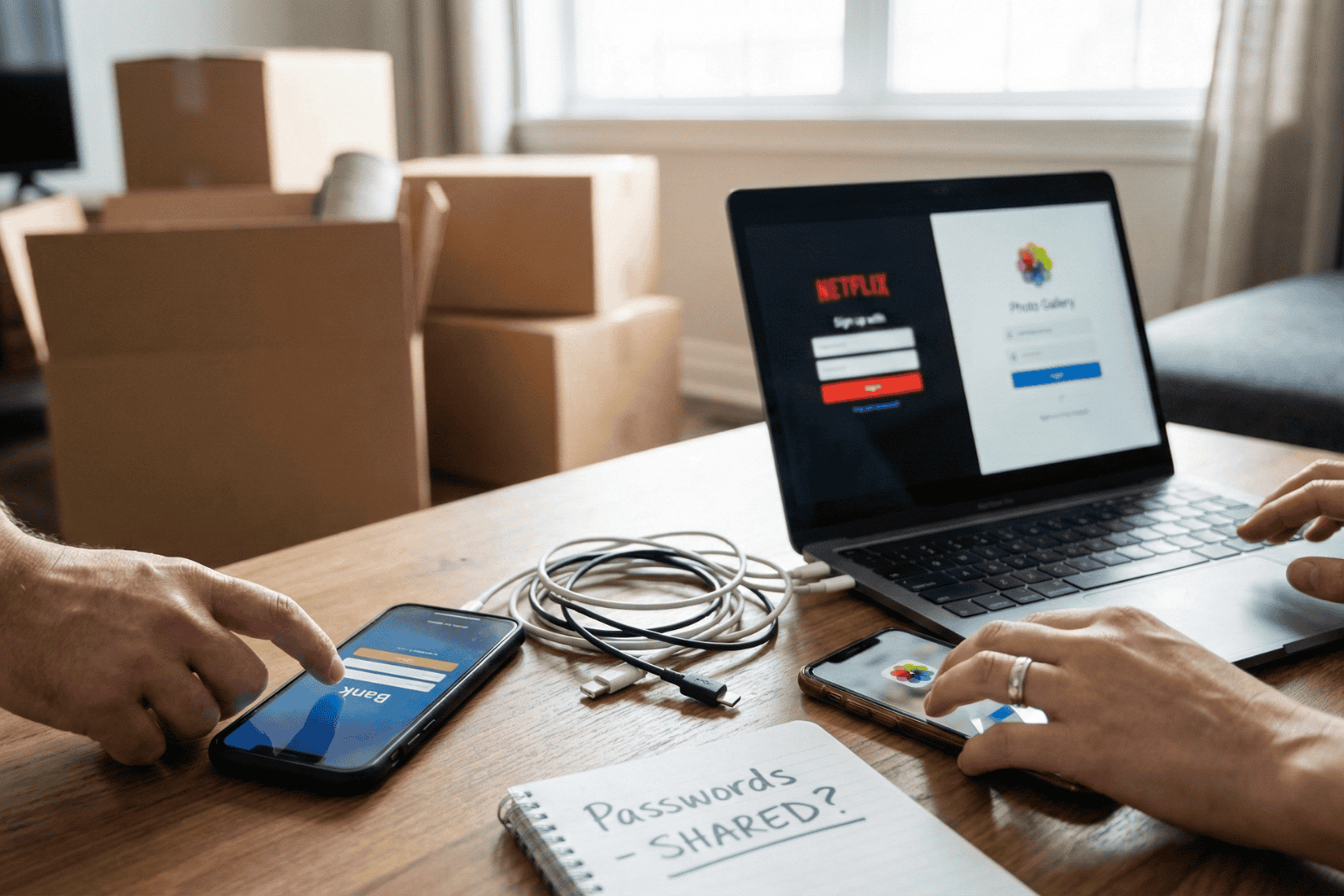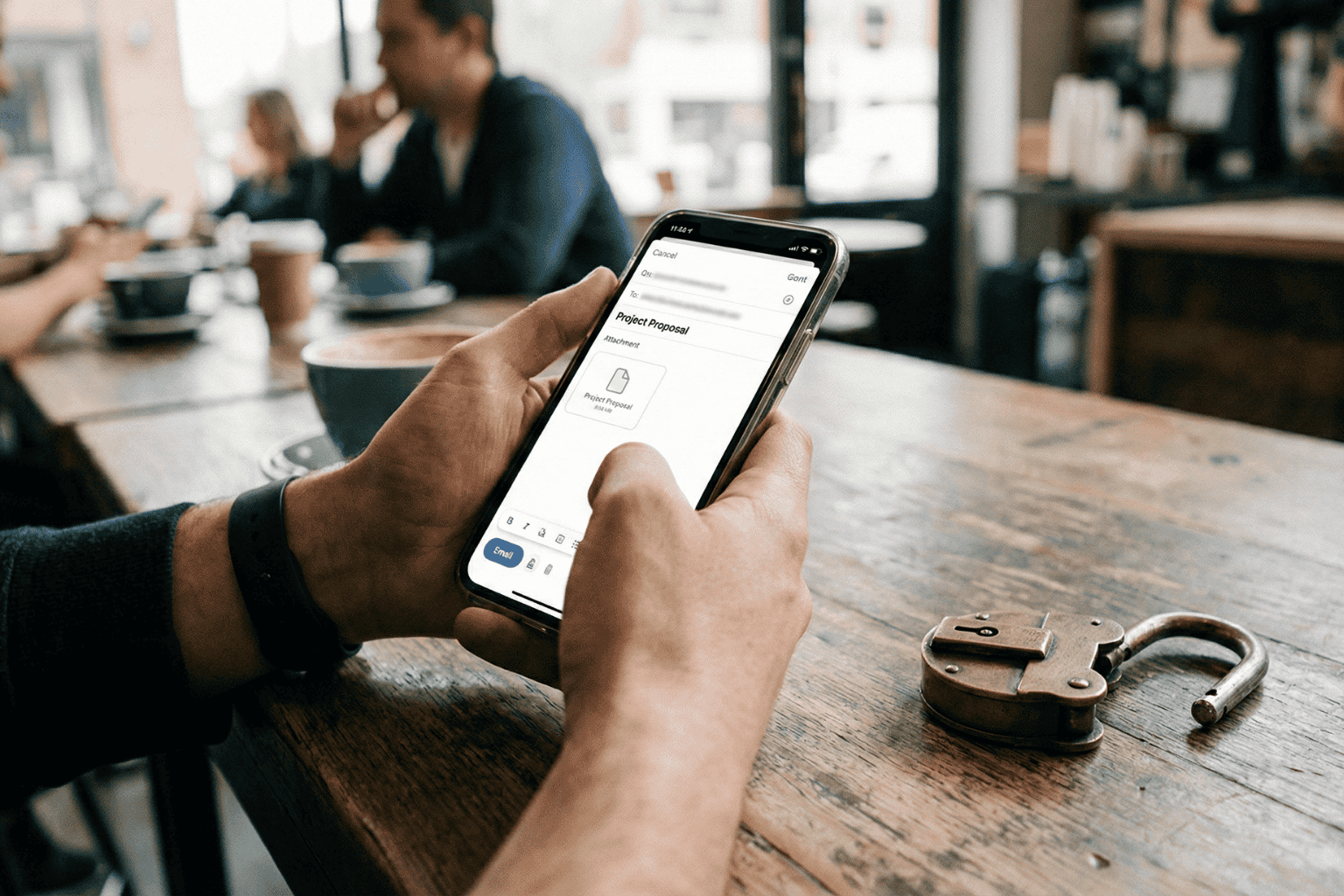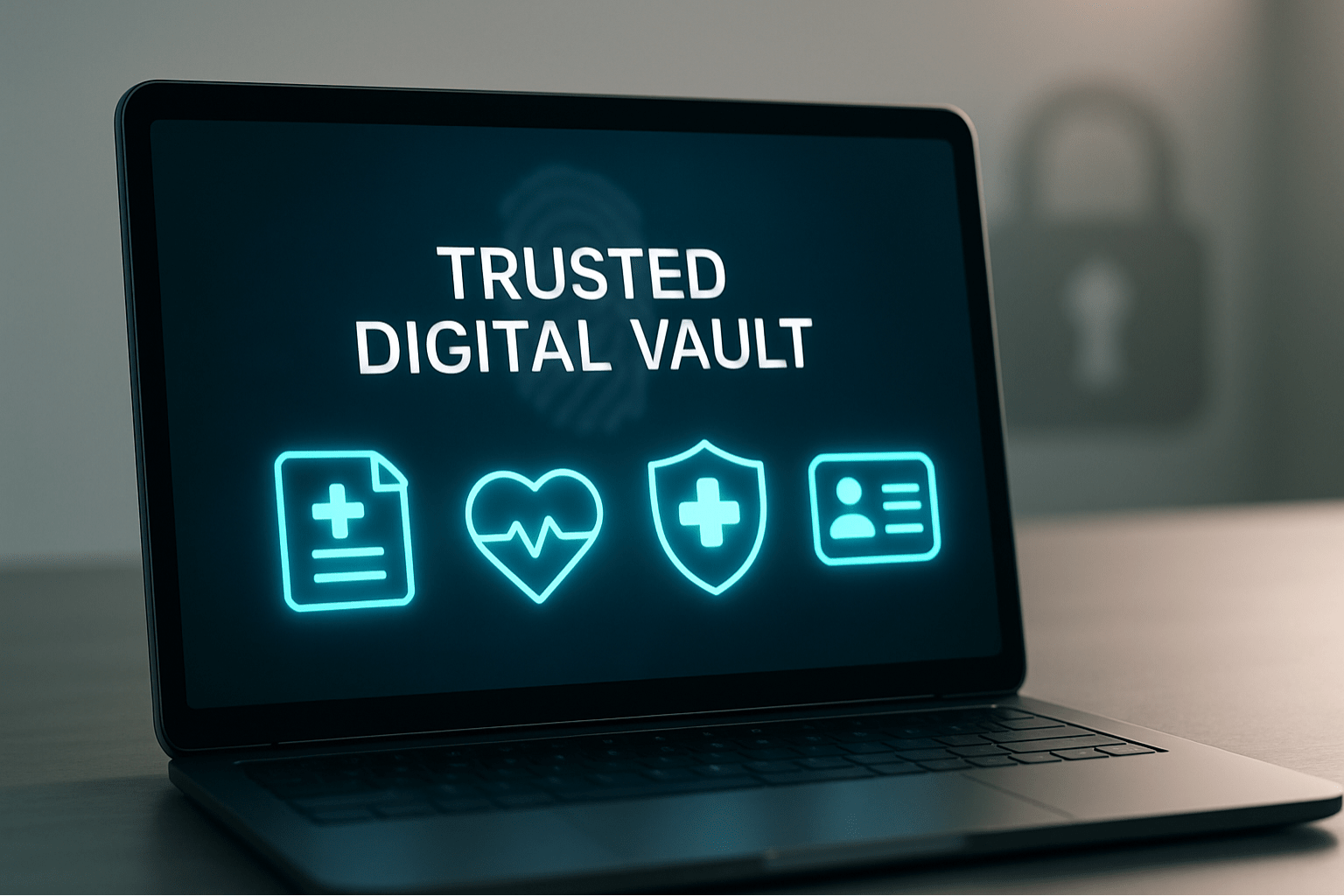Category: User Privacy
Public WiFi vs. Your Data: Why You Need a Secure Vault
January 28, 2026

The Open Window
A traveler sits at a crowded airport gate. The flight is delayed. Boredom sets in. The phone comes out, and there it is: “Free Airport WiFi.”
Click. Connected.
It feels like a small victory. A chance to check a bank balance, pay a credit card bill, or look up a policy number.
But that click? It is the digital equivalent of leaving a house key under the doormat and hoping no one looks.
In 2026, we treat our phones like fortresses. We lock them with faces and fingerprints. Yet, the moment we connect to an open network, we lower the drawbridge. We invite the world in. And the world is watching.
The Invisible Eavesdropper
Here is the ugly truth about public internet: it is loud.
When data leaves a phone on a secure home network, it whispers. On public WiFi, it screams.
The danger isn’t usually some master criminal in a hoodie. It is often just software. Simple, cheap scripts running on a laptop three seats away. These programs are like digital vacuums. They suck up everything floating through the air.
- The Man-in-the-Middle: A hacker cuts in line. The user sends a password to the bank. The hacker catches it, copies it, and then passes it to the bank. The login works. The user has no idea they just handed over their keys.
- The Fake Twin: You see a network called “Coffee_Shop_Free.” It looks real. It isn’t. A scammer set it up five minutes ago. Connect to it, and the device effectively belongs to them until you disconnect.
The “Inbox” Mistake
Fear makes people do silly things. When travelers get nervous about logging in, they turn to an old, bad habit: The Email Search.
“I won’t log in,” they think. “I’ll just find that PDF I emailed myself.”
This is a disaster.
An email inbox is not a safe. It is a glass box. Email accounts are the most hacked targets on the planet. If a thief gets into an email account, they don’t just read letters. They find the tax returns from 2024. They find the scan of the child’s birth certificate. They find the list of “backup codes.”
Using an inbox to store life’s vital documents is like hiding jewelry in a clear plastic bag. It doesn’t work.
The Real Fix: A Digital Vault
So, what is the answer? Carry a filing cabinet? Never go online?
No. The answer is a Secure Digital Vault.
This is where platforms like InsureYouKnow.org step in. They aren’t storage bins. They are armored trucks.
1. It Shreds the Data A real vault uses encryption that mimics the banking world, like Amazon Cloud security. If a hacker snatches a file from the air, they don’t get a readable document. They get noise. A jumbled mess of code that means nothing. The thief gets the envelope, but they can never read the letter.
2. Nobody Knows the Code Privacy matters. The best systems run on “zero-knowledge” rules. That means the company holding the data doesn’t have the password. Even if they wanted to look, they couldn’t. The user holds the only key.
3. Get In, Get Out With a vault, the data lives in the cloud, not on the device. A user can log in on a hotel computer, check a passport number, and vanish. No files left in the “Downloads” folder. No trail for the next guest to find.
Peace of Mind
Security usually feels like a headache. Extra steps. More passwords.
But actually? It is freedom.
It is the ability to lose a wallet in Paris and not fall apart. Why? Because the backup copies of every card and ID are sitting behind an iron door in the cloud. Accessible. Safe. Ready.
Public WiFi is fine for reading gossip columns or checking the weather. But for the heavy stuff like the money, the legacy, and the identity, stay off the open road. Put the valuables in a vault. Lock it up. Then go enjoy the coffee.
Swedish Death Cleaning for Your Digital Life: A Simple Guide
January 15, 2026

The mess you can’t see
There is a Swedish concept that has been making the rounds lately called döstädning. In English, it translates to “Swedish Death Cleaning.” It sounds a bit dark on the surface. Maybe even depressing. But the idea is actually pretty practical: you clear out your physical belongings, the dusty boxes, the clothes that don’t fit, the broken furniture, so your family isn’t stuck dealing with a mountain of junk when you are gone.
But here is the thing about modern life in 2026: the biggest mess isn’t in the garage. It’s floating in the cloud.
People are walking around right now with thousands of blurry photos, email accounts from ten years ago, and passwords that exist only in their heads. It is a silent chaotic mess. And if something happens, that digital chaos becomes a massive headache for the people left behind. Applying a little döstädning to the online world isn’t just about being tidy. It is about saving loved ones from a nightmare.
First, stop the bleeding
Before trying to organize the important stuff, the useless noise has to go.
Think about the average inbox. It is usually stuffed with newsletters that haven’t been opened since 2019 and receipts for things long thrown away. The first step of the clean-up is arguably the best part: hitting unsubscribe. If a subscription hasn’t provided value in the last six months, cut it loose.
Then look at the bank statement. How many streaming services or random apps are charging five dollars a month for nothing? Canceling those doesn’t just save cash today; it stops a confusing financial web from forming later. It is less for the family to untangle.
And then, the photos. Digital hoarding feels safe because it doesn’t take up room in the house. But leaving someone 50,000 screenshots to sort through is rough. Deleting the junk helps the real memories stand out.
The problem with passwords
Imagine cleaning up a whole house, locking the front door, and then throwing the key into a river. That is basically what happens when a digital life is organized but locked down.
In the past, important documents lived in a filing cabinet. A physical key could be found. Today? The “key” is a complex password or a face scan. If nobody else has those credentials, the assets inside, bank accounts, sentimental emails, crypto wallets, might as well not exist. They are locked in a digital vault with no door.
Scribbling passwords on a sticky note is risky. But keeping them entirely memorized is worse.
A smarter way to store it
Once the trash is deleted, what is left? The vital stuff. The deeds, the insurance policies, the wills, the vet records for the dog. These are the papers families panic over during an emergency.
Leaving these files scattered across three different cloud drives and a laptop desktop is a recipe for disaster. The strategy has to shift from “saving” to “managing.”
This is why platforms like InsureYouKnow.org are picking up steam. They aren’t just storage drives. They are digital safety deposit boxes. It gives people a single, encrypted place to put the things that actually matter. And unlike a regular hard drive, it bridges the gap. It keeps the data safe from hackers but ensures a trusted person can actually get to it when they need to.
It answers the question “Where is the policy?” before anyone even has to ask.
A lighter load
Calling it “Death Cleaning” makes it sound heavy. But honestly? It feels more like life cleaning.
There is a real sense of relief that comes from knowing the digital house is in order. No more background stress about lost files or forgotten logins. Just the calm knowledge that if life throws a curveball, the family won’t be stuck fighting with customer support to get into an account. They will have everything they need, right there, ready to go.
5 Scams Targeting Seniors in 2026 (And How to Lock Down Your Data)
January 1, 2026

Can you believe it is 2026? We have apps for everything and phones that are smarter than the computers we grew up with. But there is a flip side. All this tech has handed crooks a brand new playbook. And let’s be honest, they love targeting seniors.
The scams floating around right now aren’t the sloppy emails we used to laugh at. These new ones are sharp. They use fancy tech and psychological tricks to bypass your gut instincts. But don’t worry. You don’t need to be a tech wizard to stay safe; you just need to know what the red flags look like.
Here is what is happening out there and how to keep your private life private.
1. The “Grandchild” Voice Clone (It’s Not Them)
You might remember the old version of this trick. Someone calls pretending to be a grandson in trouble. Usually, you could tell it wasn’t him because the voice was off.
Well, the game has changed.
Scammers are now grabbing snippets of audio from social media videos. If your grandchild posted a video on TikTok or Instagram, that is all they need. They use AI to clone the voice. When the phone rings, it sounds exactly like them. Same laugh, same tone. They will say they are in jail or stuck in Mexico and need money fast.
What to do:
- The Password Rule: Agree on a secret family password. If “Bobby” calls saying he is in trouble, ask for the password. If he can’t give it, hang up.
- Don’t Panic: Hang up and call their real cell phone number. Verify it yourself.
2. The “Computer Meltdown” Pop up
You are just reading the news or looking for a recipe, and suddenly BAM. A siren starts wailing from your speakers. A box pops up on the screen saying your computer is infected and you have to call “Microsoft” immediately.
It is terrifying, right? That is the point.
But here is the truth. It is all smoke and mirrors. Your computer is fine. The person on that phone line isn’t tech support; they are a thief waiting for you to open the front door. If you let them “remote in,” they will swipe your passwords or charge you for fixing a problem that didn’t exist.
What to do:
- Ignore the Number: Real companies like Apple or Microsoft will never put a phone number on a warning pop up. Never.
- The Hard Reset: If your mouse freezes, just hold the power button down until the screen goes black. Turn it back on, and the “virus” will be gone.
3. The Medicare “Chip Card” Trap
Medicare rules are a maze, and scammers know it. The latest trick? A friendly phone call telling you that you are due for a “refund” or a new “chip card.”
It sounds great, doesn’t it? But then comes the catch. To get the goods, they say they just need to “verify” your Social Security Number or your current Medicare ID.
What to do:
- Guard It: Treat your Medicare number like the combination to a safe.
- Check Your Vault: Don’t take a stranger’s word for it. If you keep your insurance details stored in a secure spot, like the InsureYouKnow.org portal, you can just log in and check your official policy. Call the number on your documents, not the one the stranger gave you.
4. The “Pig Butchering” Long Game
This one is nasty because it pulls on heartstrings. It usually starts with a “wrong number” text or a random message on Facebook. The person is nice. You start chatting. Over weeks, maybe even months, you become friends.
Then, they mention money. They are making a killing in crypto or gold, and they want to help you do the same. You might even put a little money in and see it grow on a website they send you. But the moment you invest a serious amount? The website vanishes, and so does your “friend.”
What to do:
- Keep Wallets Closed: Never take financial advice from someone you have only met through a screen.
- Do Your Homework: If they send a photo, run it through a Google Image search. You will probably find that picture belongs to a model or someone else entirely.
5. The Fake Government Threat
Fear is a powerful tool. Scammers love to pretend they are the IRS or the Social Security Administration. You will get a text or voicemail saying your account is “suspended” or you owe back taxes.
They will threaten arrest if you don’t pay right now. And weirdly, they often want payment in gift cards.
What to do:
- Gift Cards equal Scam: The government will never ask you to pay a fine with an Amazon gift card. That just doesn’t happen.
- Slow Down: They want you to panic so you stop thinking. Take a breath. It is almost certainly fake.
The Secret Weapon? Getting Organized.
Why do these scams work? Because they rely on chaos. They hope you don’t know where your real policy is. They hope you can’t find the right phone number to check if the story is true.
If you have your house in order, they can’t touch you.
When you have your vital info, like IDs, policies, and bank contacts, locked in a secure, encrypted hub, you have the power. If someone calls about your life insurance, you don’t have to guess. You log in, look at the real document, and you see the truth.
Stay Safe Out There:
- Verify, Verify, Verify: Don’t trust Caller ID.
- Lock It Up: Use a secure service to store your life’s paperwork.
- Buddy System: Share access to that digital vault with a family member you trust. It helps to have backup.
You don’t have to be paranoid to be safe in 2026. You just have to be organized.
Divorce & Data: How to Split Your Digital Life Safely
December 26, 2025

The Digital Aftermath
Breaking up used to mean splitting the vinyl collection and deciding who keeps the couch. Simple. Tangible. But today? The most complicated part of a separation isn’t sitting in the living room; it’s floating in the cloud.
We live online. A marriage in 2025 is basically a massive web of shared Netflix logins, joint bank apps, Amazon purchase histories, and thousands of photos on a server somewhere. This is the “Digital Split,” and honestly, it is messy. If people ignore it, they risk more than just awkwardness. They risk security leaks, drained accounts, and losing memories that actually matter.
Untangling this web takes a bit of grit, but it has to be done. Here is the playbook for separating a digital life without everything crashing down.
1. The Audit (Or: Seeing the Mess)
Before changing a single password, stop. Take a breath. You can’t fix what you can’t see. Most couples are far more digitally enmeshed than they realize. The first move is a simple audit.
Sit down and write it out. All of it.
- The Money: It’s not just the big bank account. Think Venmo, PayPal, crypto wallets, and those “buy now, pay later” apps.
- The Boring Stuff: Who pays the electric bill? Whose email is on the mortgage portal?
- The Fun Stuff: Spotify duos, Netflix profiles, gaming accounts.
- The Doorstep: Uber, Lyft, DoorDash.
Imagine the chaos if one person kills a shared credit card on Amazon without saying a word. Subscriptions bounce. Deliveries get canceled. It’s a headache nobody needs right now. Awareness is the best defense.
2. Locking the Virtual Doors
Once the list is ready, it’s time to secure the perimeter. Financial data is vulnerable, and emotions can make people do rash things.
For personal accounts like email, private checking, and social media, the passwords need to change. Today. And please, no more using the dog’s name or that old anniversary date. Pick something random.
This is also the moment to turn on Two-Factor Authentication (2FA) everywhere. It’s annoying, sure, but it’s a lifesaver. Even if an ex-partner guesses the new password, they can’t get in without the code sent to the phone. Also, dig into credit card apps and check for “authorized users.” If that isn’t cleared up, one person could be stuck paying for the other’s post-breakup therapy shopping.
3. The Photo Dilemma: Keep, Don’t Delete
This hurts the most. Who gets the pictures? The wedding video? The baby photos? Unlike a physical album, nobody has to lose out here.
The rule is strict: Duplicate, don’t delete.
Legally, wiping a hard drive or deleting a cloud account can be seen as destroying assets. It’s a bad look in court. Instead, buy a big external hard drive. Download everything, every shared memory, and hand the drive over. Or, use Google Photos to make a massive shared album, let them download it all, and then cut the link. Everyone walks away with their memories intact. No data lost.
4. Cutting the Invisible Ties
Then there are the things running in the background. The invisible tethers.
Check location sharing. Apps like “Find My” or Google Maps are great for knowing when a spouse is home for dinner, but after a split? It’s just surveillance. Unless there’s a solid reason to keep it on, like co-parenting coordination, shut it down.
The smart home is another trap. If one partner moves out, they shouldn’t still have the code to the front door or access to the Nest cameras. Watching an ex-partner come and go via a phone screen isn’t healthy for anyone.
5. The “Legacy” Check
It’s dark, but it matters. Check the beneficiaries.
Life insurance, 401(k)s, and investment apps all have that little “Transfer on Death” field. People fill it out once and forget it exists. If it isn’t updated, an ex-spouse could technically inherit money meant for kids or a new family ten years from now. It takes five minutes to fix, but it saves a lifetime of legal trouble later.
Final Thoughts
Separating a life is heavy work. But in this era, the digital separation is just as heavy as the physical one. It’s about privacy, security, and eventually, peace of mind. By locking down the data and safely copying the memories, the path forward gets a little bit clearer.
Pull the last three months of bank statements. That’s usually where the hidden subscriptions are hiding. Good luck.
Why Emailing Files to Yourself Is Not a Secure Strategy
December 17, 2025

It happens. A tax return needs saving. A passport needs copying. Time is short. The solution seems obvious: attach the file, type in the email address, and hit send.
Done. Safe. Accessible from anywhere.
Or so it seems.
That “Sent” folder feels like a private archive. In reality, it is a ticking time bomb. Cybersecurity pros don’t view email as a vault. They view it as a sieve. It leaks. And when it comes to the blueprints of a person’s life, wills, deeds, insurance policies, using email for storage isn’t just a bad habit. It is a security nightmare.
The Glass Envelope
Here is the thing about email. It feels private. It requires a password to log in, after all. But once a message leaves the draft folder, it travels across the open web. It hops from server to server.
Think of it less like a sealed letter and more like a postcard. The postman can read it. The sorting clerk can read it. Anyone who intercepts the mail truck can read it.
While big tech companies lock the front door, the data inside often sits in plain text. If a hacker guesses a password, or if the email provider has a breach, those attachments aren’t encrypted. They are just sitting there. Open. Readable. Ready to be stolen.
The Trap of “Searchability”
The best feature of email is also its biggest flaw. It is searchable.
Type “tax” into the search bar, and boom: five years of returns appear. Convenient for the user? Absolutely. But it is even more convenient for a thief.
When cybercriminals crack an account, they don’t scroll through boring updates from Netflix or Amazon. They run bots. These automated scripts hunt for gold. They scan for keywords like “SSN,” “Scan,” “Medical,” or “Deed.”
In three seconds flat, a hacker can scrape a decade of sensitive life data. That PDF of a driver’s license sent in 2019? The user forgot it. The hacker found it. And now, identity theft is just a few clicks away.
The “Whoops” Factor
Then there is the human element. We are clumsy.
Predictive text is great until it isn’t. A user starts typing “Sarah” to send a financial statement to a spouse. The computer autofills “Sarah” the realtor from four years ago. The “Send” button is hit before the brain catches up.
Too late.
There is no taking it back. A total stranger now holds the keys to a private financial life. It happens constantly. It is messy. And it is completely preventable.
The Fix: A Real Vault
If the inbox is a postcard, a Secure Digital Vault is a steel fortress.
This is why platforms like InsureYouKnow.org exist. They don’t just “store” files. They lock them down.
The difference lies in the math. Real security uses AES-256 encryption. Imagine taking a document and putting it through a shredder that turns it into millions of mathematical shards. The only person with the glue to put it back together is the account owner. Even if a thief stole the server, they would get nothing but digital noise.
Plus, a vault brings order to chaos.
When a crisis hits, a fire, a sudden hospital trip, nobody wants to dig through a mountain of spam to find an insurance policy. A vault keeps things sorted. Medical. Legal. Financial. Everything in its right place.
The Bottom Line
Convenience is a trap. Saving ten seconds by emailing a file is not worth the misery of untangling a stolen identity.
Vital documents don’t belong in the “Sent” folder. They belong behind a lock. So, go ahead. Search the inbox for “scan.” Delete the results. And put those files somewhere they actually belong.
What Happens to Your Digital Assets After You Die?
September 24, 2025

We spend so much of our lives online that it’s easy to forget just how much we’ve tucked away in digital spaces. Photos on Google Drive. A lifetime of emails. Bank apps, crypto wallets, even the music and books we’ve bought but never actually “own.” All of these things add up to what people now call your digital assets.
The tricky question is: what happens to them when you’re no longer here?
A Hidden Part of Your Estate
Think about how a traditional estate works. You leave a house, some savings, maybe a car, and your family knows how to claim those things. But with digital property, it is different. Passwords lock things up. Privacy laws keep companies from handing over your accounts. In many cases, providers do not even recognize heirs unless you have given explicit permission.
That means your online life, all those accounts and files, might just sit there untouched. Some platforms will eventually delete them. Others freeze them in time. And unless someone has the right access, even valuable things like cryptocurrency can disappear forever.
Why Families Struggle
It is easy to imagine the problems. Maybe your daughter knows you kept all the family photos in your Google account but cannot get past the two-factor authentication. Or perhaps you held a few thousand dollars in a crypto wallet that requires a private key only you knew. Even something as simple as canceling a subscription can be a nightmare if nobody has your login.
The result? Frustration, wasted time, and sometimes permanent loss.
The Law and the Fine Print
Adding to the confusion are the laws and service agreements. In many places, executors do not automatically get digital access. US states that follow a law called RUFADAA allow it only if you have given written consent, usually in your will. Big tech companies add another layer: Google lets you set up an Inactive Account Manager, Facebook has legacy contact settings, and Apple has its own Digital Legacy program. If you do not turn those on, your family may have no options.
So between legal barriers and tech restrictions, the default outcome is often nothing happens and accounts remain locked away.
How You Can Plan Ahead
The solution is not complicated, but it does take a little thought:
- Make a list of important accounts. It does not have to be detailed, but your family should at least know what exists.
- Decide who should handle them. Pick someone you trust and tell them they will be your digital executor.
- Write it into your will. A line or two giving that person authority can make a big difference.
- Use built-in tools. Set up legacy contacts where available. It only takes a few minutes.
- Keep access information safe. A password manager with emergency access, or a sealed note in a safe, works better than trying to share details in casual ways.
The key is to make sure someone you trust knows how to act when the time comes.
One practical way to protect your digital legacy is by using a secure service like InsureYouKnow. It allows you to store important documents, account information, and passwords in a safe, encrypted digital vault. You can control who has access and receive reminders to keep your records up to date, making it easier for your loved ones to manage your digital assets according to your wishes.
Why It Matters
Digital assets are not just about money. Sure, cryptocurrency or an online business can carry real financial weight, but the sentimental side matters just as much. Family photos, voice notes, or personal letters stored in an inbox can be treasures to those you leave behind. Without a plan, those things may vanish into the cloud forever.
By setting aside an hour or two to prepare, you can spare your loved ones unnecessary stress and give them access to the parts of your life that matter most.
Easy Cybersecurity Tips for Everyday People | InsureYouKnow
September 17, 2025

For a lot of folks, “cybersecurity” sounds like something only big companies or computer geeks deal with. But the truth? Hackers usually go after regular people because it’s easier. A weak password, one wrong click, or an ignored update can open the door to stolen money or lost files.
The good news is: basic habits can block most of it. No tech degree required.
Passwords People Actually Remember
Too many people still use “123456” or their dog’s name. One local teacher did exactly that and her email got hacked. The criminal then tried the same password on her shopping account and social media. It worked.
A better option is something odd but memorable. Instead of “Fluffy123,” think of a goofy phrase like BlueShoesDance99. Long, random, easy to remember. And honestly, password managers are a lifesaver when accounts pile up.
That Extra Lock (2FA)
Two-factor authentication might sound fancy, but it’s just a second lock. A small business owner nearly lost access to his email until 2FA blocked the hacker, who couldn’t get the code sent to his phone.
Most banks, emails, and social apps have it. Turning it on takes maybe two minutes.
Don’t Snooze Updates Forever
Almost everyone hits “remind me later” when updates pop up. A family ignored updates for months until their computer froze with malware. Repairs cost more than the laptop.
Updates may be annoying, but they fix holes criminals know about. Letting them run overnight is the easiest fix.
Those Sneaky Emails
Scam emails are slick these days. A retiree thought her bank was threatening to close her account unless she clicked a link. The logo looked perfect. Luckily, she noticed the sender’s email address was slightly off. One phone call to the real bank confirmed it was fake.
If an email feels urgent or fishy, don’t click. Go straight to the company website or call instead.
Backups Save Heartbreak
One father lost every baby photo after his hard drive failed. No backup. Nothing to recover. Since then, he keeps copies in two places: a small external drive and cloud storage. That way, if one fails, the other survives.
Phones Count Too
Phones hold more personal info than many computers. Losing an unlocked one is like handing over the keys to a stranger. A PIN or fingerprint lock is quick protection. It’s surprising how many people still skip it.
Oversharing Online
Birthdays, street names, even a child’s school—these little details show up in people’s posts every day. Hackers love that because those details often answer security questions. Keeping some things private online makes their job harder.
Quick Checks Make a Difference
A quick weekend check of accounts helps. One person caught a strange $7 charge on his debit card—it turned out to be a test run by a thief. Because he noticed early, the bank froze the card before anything bigger happened.
If Trouble Hits
If an account gets hacked, the worst thing is to freeze. Call the bank, reset passwords, and lock accounts quickly. Backups make recovery much easier. Families who’ve thought about these steps bounce back faster.
Wrapping Up
Staying safe online isn’t about being a tech expert. It’s about a handful of habits: stronger passwords, two-factor logins, letting updates run, backing things up, spotting fake emails, and not oversharing.
It’s the digital version of locking the front door. Not perfect, but it keeps most trouble out.
And remember, protecting digital life also means protecting the important documents behind it—insurance policies, medical files, wills, financial records, even family photos. A secure, organized place like InsureYouKnow.org helps individuals and families keep critical information safe, accessible, and private. Pairing smart cybersecurity habits with a trusted storage solution creates real peace of mind.
Digital Pet Records: Organize and Store Pet Documents Securely
September 3, 2025

Pet emergencies rarely arrive at the right time. A dog limps after a jump. A cat suddenly won’t breathe easily. Owners grab at folders, glove compartments, even the folded vaccination slip that’s been stuck under a fridge magnet for months, only to realize the insurance info or medical history is still missing.
The vet keeps asking questions. What shots were given? What allergies are known? Too much time slips away.
That’s why keeping pet records, health notes, policy papers, and vet numbers saved in one secure digital spot makes such a difference. Instead of chaos, the details are ready in seconds. And that can mean faster decisions and better care when pets need it most.
Why Digital Pet Records Matter
In a real emergency, minutes feel heavy. A vet may ask about past shots or allergies, but the papers are often buried, tucked in a kitchen drawer under receipts or lost in an old email. With digital pet records, the answers are ready in seconds, and treatment doesn’t have to wait.
The same holds true when care is handed off. A sitter, a family member, even a boarding kennel can check pet medical files online instead of relying on rushed notes over the phone.
The truth is, organized records bring peace of mind. Storing pet papers safely in one place removes clutter and helps ensure steady care, whether at home, traveling, or in an emergency room late at night.
What to Include in Your Digital Pet Emergency Kit
When something goes wrong, the last thing anyone wants is to dig through drawers for missing papers. A simple digital kit avoids that headache.
The basics come first: vaccination records and health notes. Vets usually ask for them before doing anything else.
If the pet has coverage, add the insurance policy number and provider. It saves phone calls later. Keep proof of ownership too, like microchip info, adoption papers, or even a vet’s ID slip.
An emergency contact list matters just as much. The family vet, a backup clinic, a sitter, and one relative who can step in should all be easy to reach.
Then there are the little things. Care notes about food, medicine, or allergies may sound small, but they help anyone give consistent care. Storing these pet papers online in one safe place means less panic and faster help when every minute counts.
How to Securely Store Pet Documents Using InsureYouKnow
InsureYouKnow makes it simple to keep pet papers in order. Snap a photo of a vaccine slip or scan an insurance form, then upload it with a clear label like “Bella – Shots” or “Max – Insurance.” No more shuffling through drawers when the vet is waiting.
The files stay safe with encryption, so medical notes and policy numbers are private but easy to reach. Reminders can be set for shots or policy renewals, which means nothing gets overlooked.
Sharing is easy too. A sitter, boarding place, or vet can be given access to just the records they need, making care smoother and less stressful.
With everything in one place, digital pet records stay organized, secure, and ready when pets need it most.
Organizing and Managing Pet Info
Saving files is just the start. How they’re organized matters. Clear labels like “Vaccination,” “Insurance,” or “Ownership” make documents easy to find.
Adding details like the pet’s name, birthdate, or microchip number helps avoid mix-ups, especially with multiple pets.
Updates are important too. After checkups, insurance renewals, or when a new pet joins, taking a few minutes to update records keeps digital pet documents accurate and ready when needed.
Emergency Scenarios Where This Helps
Imagine the dog collapses during an evening walk. Heart racing, the family grabs the leash and heads to the vet. They don’t have to dig through drawers or emails. Digital pet records are ready on a phone. Shots, allergies, medications, all visible in seconds. The vet can start treatment right away, and stress levels drop for everyone.
Not all emergencies are medical. Moving suddenly, last-minute boarding, or traveling with a pet can turn chaotic fast. Having pet papers stored securely online means sitters, boarding staff, or vets can see what’s needed without endless calls or searching.
A few organized files can turn panic into calm. Pet documents online make sure pets get the care they need, wherever and whenever an emergency strikes.
Conclusion
Just like people, pets have important papers that need care. The vet, insurance info, and vaccination slips all matter. If you’re running around during an emergency, it’s easy to lose track. That crumpled slip under the couch or buried email suddenly matters more than ever.
The truth is, digital pet records make life simpler. Snap a photo, upload it, and label it clearly. Share it with your vet, a sitter, or a boarding facility when needed. It’s quick, secure, and saves time when every second counts.
Take a few minutes today to set up your pet’s digital profile with InsureYouKnow. It’s simple, it’s safe, and it gives peace of mind knowing your furry friend’s records are ready when they’re needed most.
Digital Inheritance: Secure Your Online Legacy with InsureYouKnow
August 13, 2025

Think about how much of your life now lives online. Photos you never printed. Banking and insurance details you don’t keep in a filing cabinet. Emails, social media posts, maybe even a bit of cryptocurrency sitting in a digital wallet. It is all part of your story, and it does not just disappear when you do.
That is why digital inheritance matters. It is about making sure the people you trust can find and use what you leave behind, without having to play password detective or deal with frustrating account lockouts.
In the next few minutes, we will explore how to put a plan in place for your online life, and how a secure tool like InsureYouKnow.org can help you create a well-organized digital legacy your loved ones can actually access when it counts.
What Constitutes Digital Assets
When you think about what you own online, it is probably more than you realize. There are the obvious things like your insurance papers, bank records, medical files, and maybe a scan of your driver’s license sitting in a folder somewhere.
Then you have your accounts. Email, social media, streaming logins, and online banking all hold bits of your life, whether that is photos from years ago or details about your finances.
And do not forget the paid stuff. Cloud storage plans, memberships, crypto wallets, or payment apps like PayPal. Some of it has sentimental value, and some of it is worth real money.
Figuring out exactly what you have is step one in digital estate planning, and it makes life much easier for the people who will need to handle things later.
Risks of Digital Legacy Without Proper Planning
Not thinking about your digital stuff after you’re gone can really cause headaches. Sometimes you can’t get into accounts at all, and all those photos or important files? They might just disappear.
Hackers or scammers could also sneak in. They might use your info, drain money from digital wallets, or mess with accounts in ways that are hard to fix.
And honestly, it’s a lot for your family. They could spend hours digging for passwords, calling different companies, or trying to figure out what belongs where — all while they’re already dealing with grief.
Just taking a little time now to plan your digital estate can save a ton of trouble later and make sure the people you care about aren’t stuck sorting through a mess.
How InsureYouKnow.org Helps
Keeping track of all your digital stuff can be a pain, you know? InsureYouKnow.org makes it kind of simple. You just toss all your important docs, passwords, whatever, into one safe spot. You get to decide who sees what.
And if something happens, a family member can just log in and grab what they need. No digging through emails. No guessing passwords. Way less stress.
Honestly, it just makes your digital life easier and ready for your loved ones when it counts.
Best Practices in Preparing Your Digital Legacy
You know, getting your digital stuff in order now can save a lot of headaches later. Start by listing all your accounts and assets — emails, social media, bank stuff, subscriptions, crypto, everything.
Use password managers or secure lockers to keep logins safe. Also, jot down who should access what and how, and store it somewhere safe.
Finally, think about adding instructions in your will or estate plan. That way, your family can handle your digital life smoothly and without stress.
Step-by-Step Action Plan
Getting your digital stuff in order doesn’t have to be complicated. Here’s a simple way to do it.
- Make a list – Write down all your accounts, subscriptions, documents, crypto wallets… basically everything. Group them so it’s easy to see.
- Keep it safe – Store passwords and important docs in InsureYouKnow’s secure vault. That way, it’s all in one place and protected.
- Pick someone you trust – Decide who can access what. Set clear permissions so they know what’s theirs to handle.
- Check and update often – Things change, you know? Make a habit of reviewing your list regularly.
Doing this makes your digital life organized, safe, and way easier for your family when they need it.
Real-Life Scenario
Imagine this: Sarah had been using InsureYouKnow.org to organize her digital life. She had all her accounts, documents, and login info stored securely, and she’d assigned her brother as her digital heir with clear permissions.
When Sarah unexpectedly passed away, her brother didn’t have to hunt for passwords or guess what to do. He simply accessed the secure vault, grabbed the important files, and managed her online accounts without stress.
Thanks to pre-planning her digital estate, Sarah made things much easier for her loved ones. This shows how a little preparation can save a lot of headaches and ensure your digital legacy is handled smoothly.
Conclusion
Thinking about your digital stuff might feel a bit overwhelming, but honestly, getting it in order gives you peace of mind. Your loved ones won’t have to scramble or guess what to do.
Just start small. Make a list of your accounts and important files. Then use InsureYouKnow.org to keep everything safe and organized. A little planning now can make a huge difference later, and it keeps your digital life easy for your family.
Take Control of Your Health Data with a Digital Record Trust
July 31, 2025

Imagine having all your medical records in one place where you decide who gets to see them. That’s the idea behind a health record trust. Instead of hospitals or clinics controlling access, this system gives you full ownership of your health information.
In the traditional setup, your data is scattered across different providers. It’s hard to access quickly, and you often have to go through formal requests. A health record trust puts you in charge, making your records easier to manage, share, and keep safe.
Why Personal Ownership of Health Data Is Important
When people have control over their personal fitness statistics, they’re empowered to take rate in their care. Instead of counting on hospitals or clinics to manipulate the facts, people can access, update, and proportion their statistics when and how they pick.
This sort of ownership improves portability, permitting sufferers to hold their scientific history throughout providers and places. It also supports accuracy, considering that patients can correct mistakes and hold their data modern. Most importantly, it promotes transparency, making it easier to understand your very own health and make knowledgeable selections.
Personal fitness records possession is a key part of affected person-centered care, wherein the focal point shifts from structures to the character. It ensures your information works for you, now not the alternative way around.
Key Features of a Digital Health Record Trust
A Digital Health Record Trust offers you complete control of your scientific records with tools that keep it secure, private, and smooth to manipulate. Here’s what makes it work:
1. Secure Cloud Storage
Your information is saved within the cloud, in order that they’re usually backed up and to be had whilst you need them—on any tool, anytime.
2. Strong Encryption and Privacy Settings
All data is covered with encryption to hold your personal fitness info safe. You manipulate who sees what, and nothing is shared without your permission.
3. Controlled Sharing
You can provide get right of entry to your own family participants, caregivers, or doctors. This ensures the proper human beings assist you while wanted—specifically in emergencies.
4. Version History and Audit Trail
Every replacement is tracked. You can see what modified, while it modified, and who accessed it, so your records live clear, accurate, and trustworthy.
How InsureYouKnow Supports These Core Principles
InsureYouKnow places you in control of your virtual health statistics. You can manage who sees your files with custom to get admission to permissions—whether or not it’s a circle of relatives, medical doctors, or caregivers.
All files are stored securely inside the cloud with sturdy encryption, preserving your touchy fitness statistics personal and protected.
Built-in reminders assist you hold the whole lot present day, so your facts are always updated while you need them maximum.
Real-Life Use Cases for Digital Health Record Access
1. Travel or Relocation
Whether you’re shifting to a brand new city or journeying abroad, having instantaneous admission to your virtual health facts guarantees docs can get the facts they need quickly—even if you’re a ways from home.
2. Transition of Care
As teens circulate from pediatric to adult care, a secure fitness document machine allows them to make that transition smoother. With all clinical records in a single location, new vendors get the entire image without delays.
3. Long-Term Caregiving
For caregivers coping with the fitness needs of a parent, spouse, or baby, digital access to scientific facts is crucial. It simplifies coordination, reduces stress, and ensures the proper decisions are made at the right time.
Simple Action Steps to Take Control of Your Health Records
1. Review How You Store Your Health Documents
Start by checking in which your scientific records, coverage papers, and emergency contacts are stored. Are they scattered across folders, emails, or physical documents? A short audit enables you to notice what’s lacking or old.
2. Choose Trusted People for Emergency Access
Think approximately who needs to be capable of viewing your information in case you’re ever in an emergency. It might be a partner, adult toddler, caregiver, or dependent on a pal. Make sure they know the way to get entry to what’s wished while time subjects most.
3. Set Up a Secure Digital Vault with InsureYouKnow
InsureYouKnow allows you to construct a non-public health record machine that acts like a virtual “relied on vault.” You can prepare your medical data set, get admission to permissions, and hold the whole thing competently stored in a single area with strong encryption and cloud safety.
Conclusion
Taking ownership of your health facts isn’t just about convenience—it’s about being organized, knowledgeable, and in control. When you control your own fitness records, you reduce the threat of delays throughout emergencies, enhance communique among vendors, and ensure nothing vital is misplaced or neglected.
By preserving your documents prepared, available, and steady in a relied on platform like InsureYouKnow, you create a machine that works for you and your family—each time and everywhere. It’s a simple step that brings lengthy-time period peace of mind and strengthens your potential to make informed selections approximately your care.
Now is the time to take control of your health statistics and construct a more secure, smarter future.
